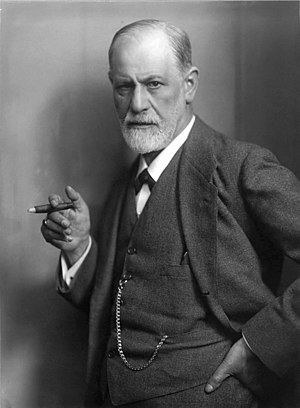
The woman who refuses to see her sexual organs as mere wood chips, designed to make the mans life more comfortable, is in danger of becoming a lesbian--an active, phallic woman, an intellectual virago with a fire of her own .... The lesbian body is a particularly pernicious and depraved version of the female body in general; it is susceptible to auto-eroticism, clitoral pleasure and self-actualization.
Share this quote:
Where does a thought go when its forgotten?
Share this quote:
It is a predisposition of human nature to consider an unpleasant idea untrue, and then it is easy to find arguments against it.
Share this quote:
When one does not have what one wants, one must want what one has.
Share this quote:
In this way the ego detaches itself from the external world. It is more correct to say: Originally the ego includes everything, later it detaches from itself the external world. The ego-feeling we are aware of now is thus only a shrunken vestige of a far more extensive feeling - a feeling which embraced the universe and expressed an inseparable connection of the ego with the external world.
Share this quote:
If we turn to those restrictions that only apply to certain classes of society, we encounter a state of things which is glaringly obvious and has always been recognized. It is to be expected that the neglected classes will grudge the favoured ones their privileges and that they will do everything in their to power to rid themselves of their own surplus of privation. Where this is not possible a lasting measure of discontent will obtain within this culture, and this may lead to dangerous outbreaks. But if a culture has not got beyond the stage in which the satisfaction of one group of its members necessarily involves the suppression of another, perhaps the majority---and this is the case in all modern cultures,---it is intelligible that these suppressed classes should develop an intense hostility to the culture; a culture, whose existence they make possible by their labour, but in whose resources they have too small a share. In such conditions one must not expect to find an internalization of the cultural prohibitions among the suppressed classes; indeed they are not even prepared to acknowledge these prohibitions, intent, as they are, on the destruction of the culture itself and perhaps even of the assumptions on which it rests. These classes are so manifestly hostile to culture that on that account the more latent hostility of the better provided social strata has been overlooked. It need not be said that a culture which leaves unsatisfied and drives to rebelliousness so large a number of its members neither has a prospect of continued existence, nor deserves it.
Share this quote:
Every man is a poet at heart.
Share this quote:
There is only one state- admittedly an unusual state, but not one that can be stigmatized as pathological- in which it does not do this. At the height of being in love the boundary between ego and object threatens to melt away. Against all the evidence of his senses, a man who is in love declares that I and you are one, and is prepared to behave as if it were a fact.
Share this quote:
It is that we are never so defenceless against suffering as when we love, never so helplessly unhappy as when we have lost our loved object or its love.
Share this quote:
We are so made that we can derive intense enjoyment only from a contrast and very little from a state of things.
Share this quote:
This time once again it has been my chief aim to make no sacrifice to an appearance of being simple, complete or rounded off, not to disguise problems and not to deny the existence of gaps and uncertainties. In no other scientific field would it be necessary to boast of such modest intentions. They are universally regarded as self-evident; the public expects nothing else. No reader of an account of astronomy will feel disappointed and contemptuous of the science if he is shown the frontiers at which our knowledge of the universe melts into haziness. Only in psychology is it otherwise. There mankinds constitutional unfitness for scientific research comes fully into the open. What people seem to demand of psychology is not progress in knowledge, but satisfactions of some other sort; every unsolved problem, every admitted uncertainty is made into a reproach against it.Whoever cares for the science of mental life must accept these injustices along with it.
Share this quote:
He who knows how to wait need make no concessions.
Share this quote:
Religion is an illusion and it derives its strength from the fact that it falls in with our instinctual desires.
Share this quote:
Dark, unfeeling and unloving powers determine human destiny.
Share this quote:
He does not believe that does not live according to his belief.
Share this quote:
With words one man can make another blessed, or drive him to despair; by words the teacher transfers his knowledge to the pupil; by words the speaker sweeps his audience with him and determines its judgments and decisions. Words call forth effects and are the universal means of influencing human beings.
Share this quote:
The words which we use in our everyday speech are nothing other than watered-down magic.
Share this quote:
Words and magic were in the beginning one and the same thing, and even today words retain much of their magical power.
Share this quote:
The child is brought up to know its social duties by means of a system of love-rewards and punishments, and in this way it is taught that its security in life depends on its parents (and, subsequently, other people) loving it and being able to believe in its love for them.
Share this quote:
Where does a thought go when it’s forgotten?
Share this quote: